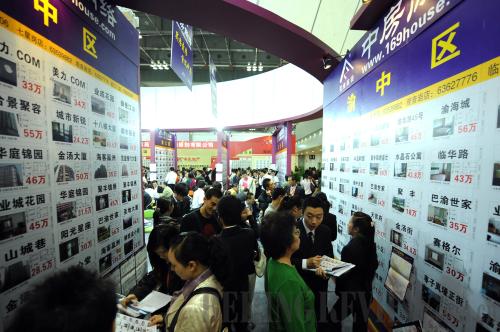|
 |
|
HOUSING BOOM: Buyers look at properties at a fair of used houses in Chongqing. House prices in the city maintained an upward trend in 2009 despite the ripple effect of the financial crisis (ZHOU HENGYI) |
Nearly two years after the financial crisis, the Chinese economy is faring well—maybe too well. A recent Ministry of Land and Resources (MLR) report stated a dangerous bubble is expanding in the property market, raising concerns among policymakers.
The price surges came as a surprise—while the financial crisis plunged the world into a deep recession, sending a chill through the once-booming Chinese economy, the real estate market staged a defiant comeback. According to data from the China Land Surveying and Planning Institute, the country's average residence price soared 25 percent in 2009 from the previous year, a record rate since 2001.
But China has not been sitting idly by as the bubble expands. In Premier Wen Jiabao's government work report delivered on March 5 to the National People's Congress session, the government vowed vigorous efforts to curb house price surges in big cities and ensure a healthy and steady market. Relevant departments also stepped in with forceful countermeasures.
Cooling the property fever has proven more difficult than anticipated. House prices in first-tier cities like Beijing, Hangzhou, Shanghai and Shenzhen have grown 15-20 percent so far this year.
A closer look at the price-to-income ratio could illustrate the dangers the bubble presents. In Beijing's suburbs, prices have skyrocketed past 10,000 yuan ($1,465) per square meter, nearly four times the average monthly salary of local residents. In other words, it would take a person saving every penny of their income for 30 years to afford a 100-square meter apartment in the city.
Government in action
For the Chinese economy, the property rush was obviously a stumbling stone on the path to full recovery. And in their attempts to clear the road, policymakers have utilized all available options.
On March 10, the MLR issued a circular requiring a 50-percent down payment for land sales, and the rest of which must be paid within a year. For property developers without steady cash flows, the order was a strong disincentive to join in the property rush.
In another move, the State-Owned Assets Supervision and Administration Commission on March 26 ordered 78 centrally administered state enterprises whose core business is not real estate to pull out of the property market. These businesses had to present detailed plans of their withdrawal within 15 working days.
Meanwhile, the China Banking Regulatory Commission (CBRC) told commercial banks to suspend credit lines to the 78 enterprises, as well as developers sitting on unused land, hoarding properties or rigging prices.
A lending spree last year was meant to stimulate the economy's growth engine, but much of the credit is believed to have found its way into the housing market, sending prices out of control. The CBRC has since pledged to keep a close eye on loans and punish borrowers speculating in stock and property markets.
On March 31, the Ministry of Finance and the State Administration of Taxation jointly ordered a tightening of favorable mortgage rules, including a 70-percent discount of mortgage rates for purchases of a first home. The big four commercial banks of the country have all announced their intentions to follow the order.
On the same day the Beijing Municipal Commission of Housing and Urban-Rural Development announced penalties issued to three property developers hoarding houses, including Kinghand Investment Group Co. Ltd., Beijing Wanwei Runhe Real Estate Co. Ltd. and Zhonghong Real Estate Co. Ltd.
In February this year, the commission required developers to make public announcements concerning all house offerings within three days of obtaining pre-sale approval. They must also ensure transparency in pricing and sales.
| 